If Didier Drogba represents the image of a contemporary African hero on the global stage then who or what does Senegalese striker El Hadji Diouf represent?
Meet Digital Diouf. David Kilpatrick’s intriguing post in the New York Times GOAL blog tells us about “We Tripped El Hadji Diouf: The Story of a Photoshop Thread,” a recent exhibition at the Museum of the Moving Image in New York.
The story is about the intersection of sport, art, and digital technology. At the heart of it is a three-second clip of Diouf (at Rangers) sent flying by Hearts midfielder Ian Black’s tackle. The video was photoshopped and then posted on SomethingAwful.com, where users imaginatively molded it into extraordinarily creative and wide-ranging videos. Eventually, 35 of the videos were looped together and displayed at the Museum of the Moving Image.
“While many of the images embrace Diouf’s agony as some kind of karmic retribution for his villainy,” Kilpatrick writes, “others allow technology to revise the outcome and provide a happy ending.” Rumor has it that Dakar’s digital griots are planning a sequel.
Author: Peter Alegi
Benni Leads Orlando Pirates to PSL Title
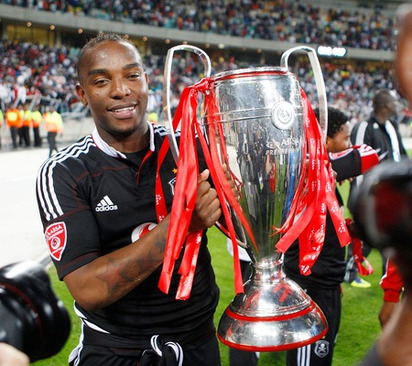 Benni McCarthy’s two second-half goals earned Orlando Pirates their second consecutive Premier Soccer League title. It was sweet revenge for McCarthy writes Rodney Reiners in the Cape Argus, “He’s been put down, trampled on, ridiculed, and dismissed as an over-weight, over-rated charlatan more often than any footballer should have to endure. Yet, each time, the 34-year-old Cape Town-born striker has come back to splatter copious bowls of beaten egg on the faces of his critics.”
Benni McCarthy’s two second-half goals earned Orlando Pirates their second consecutive Premier Soccer League title. It was sweet revenge for McCarthy writes Rodney Reiners in the Cape Argus, “He’s been put down, trampled on, ridiculed, and dismissed as an over-weight, over-rated charlatan more often than any footballer should have to endure. Yet, each time, the 34-year-old Cape Town-born striker has come back to splatter copious bowls of beaten egg on the faces of his critics.”
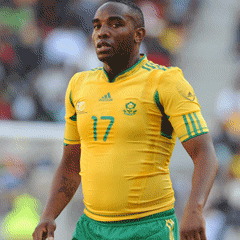 McCarthy — the most prolific scorer in Bafana Bafana’s history — has experienced a rebirth since the humiliation of being left off the 2010 World Cup squad for lack of fitness (see photo).
McCarthy — the most prolific scorer in Bafana Bafana’s history — has experienced a rebirth since the humiliation of being left off the 2010 World Cup squad for lack of fitness (see photo).
Pirates went into the tense closing Saturday with a two-point lead over Soweto rivals Moroka Swallows. Both contenders took care of business in their away matches in KwaZulu-Natal: Bucs beating Golden Arrows 4-2 at Durban’s monumental but seldom-used Moses Mabhida stadium (highlights here); The Birds winning 1-0 at Maritzburg United’s more humble and intimate Harry Gwala stadium.
Smiling broadly, Benni McCarthy told Ryan Cooper of Kick Off magazine: “I’m doing the thing I love most, and that is playing football. The haters out there . . . next year I’m gonna keep coming back with more!”
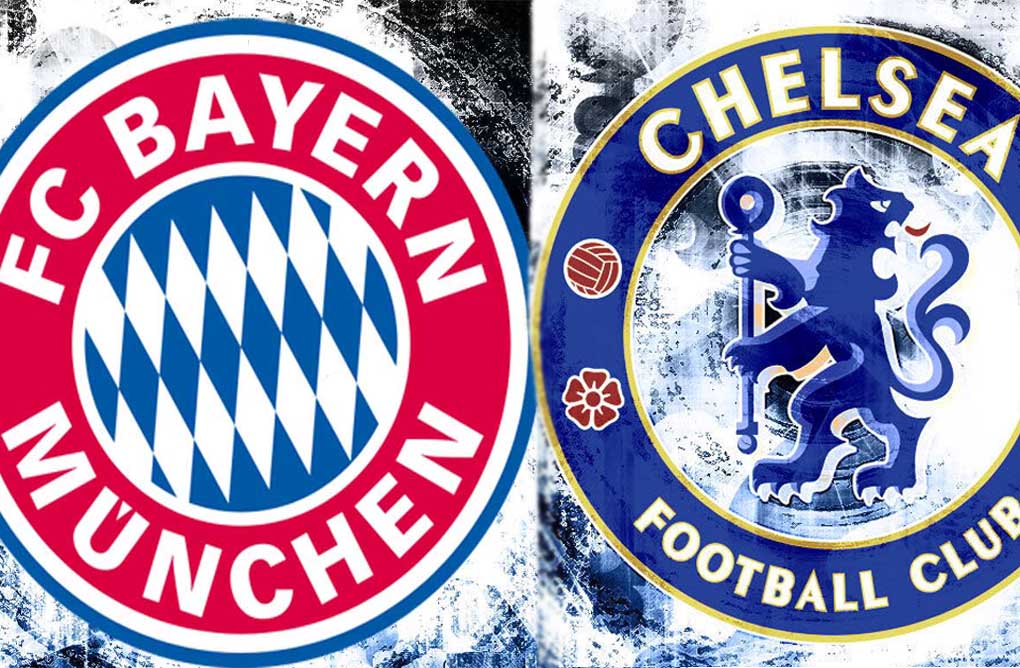
Tomorrow’s Champions League final between Chelsea and Bayern Munich seems promising, even for neutrals like me. The Bavarians are at home, but Chelsea are currently in better form. In an intriguing twist, Chelsea have four players suspended, Bayern three, “which means any assessment of what might happen is going to be dotted with ifs and maybes” writes Jonathan Wilson in his SI.com column.
So let’s play every armchair manager’s favorite fun game. My prediction: Chelsea 2, Bayern 1, possibly after extra time. Goalscorers: Drogba, Mata, and Robben.
What’s your prediction?
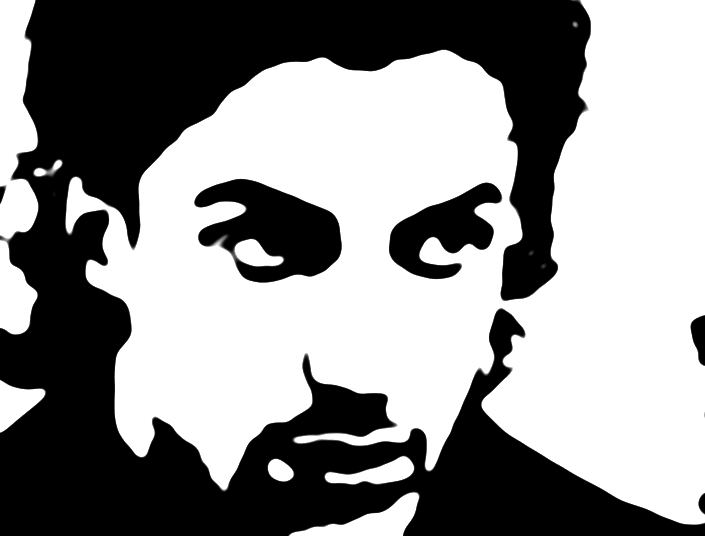
WE WERE THERE By Alessandro Del Piero
When we were winning, always. On the pitch, more than anyone else.
When we fell.
When we didn’t know where we would end up.
When we learnt, and accepted it. Struggling to rise up again.
When we took the field in Rimini.
When the others celebrated.
When we were just watching.
When they hoped we would never return.
When we started climbing back up.
When we couldn’t find our way.
When we found it: winning.
This is our party, conquered right at the last drop of sweat.
It’s the party of all those who always believed.
It’s the party of all you Juve fans who instead of abandoning us let your voice be heard even louder,
It’s the party of those who cheered for a goal in serie B as much as the one that brought the scudetto.
It’s the party, why not, of opponents (not all) who always respected us.
It’s the party of Balzaretti, Belardi, Bianco, Birindelli, Bojinov, Boumsong, Buffon, Camoranesi, Chiellini, De Ceglie, Giannichedda, Giovinco, Guzman, Kovac, Lanzafame, Legrottaglie, Marchionni, Marchisio, Mirante, Nedved, Palladino, Paro, Piccolo, Trezeguet, Venitucci, Zalayeta, Zanetti, Zebina. Manager Deschamps.
And it had to end like this, I never stopped believing.
Thank you, lads. Let’s enjoy this, we deserved it.
I was there, you were there. We were there. And we are here, finally.
We have returned.
Alessandro
[My translation from the original Italian here. Grazie Vlad for sending it!]

The football skills of Richard W. Msimang, a prominent early member of the now 100-year-old African National Congress in South Africa, were reportedly as sharp as his legal mind and political acumen. Last year on this blog I posted a portion of an article published in a 1913 issue of the ANC’s newspaper Abantu Batho (given to me by Peter Limb) that provided a glimpse into Msimang’s sporting past as a student in South Africa and Britain.
Born in Edendale, a freehold black area on the outskirts of Pietermaritzburg, KwaZulu-Natal, a community with a well-deserved reputation for defiance of colonial authority, Richard and his brothers Selby and Herbert grew up refusing to be black servants of white masters. Sport, formal education, and political activism channeled the enlightened self-interest of the Msimangs much like they informed the 20th-century South African struggle for political and cultural empowerment. Thanks to the kindness and generosity of Geoff Bisson (Queen’s College, Taunton), Brian Willan (Rhodes University), and once again Peter Limb, I can now share additional evidence of Richard Msimang’s prowess on the football and rugby pitch.
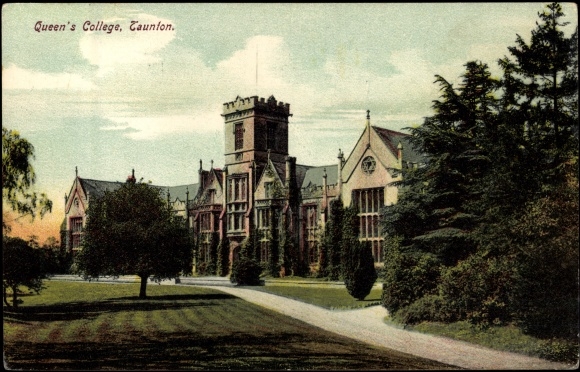 The revealing passage below focuses on Msimang’s time at Queen’s College, Taunton (see postcard), a boarding school in the West of England. In his book History of Queen’s College, Taunton (Taunton, England: Old Queenians’ Association, 1957; p. 157), H. J. Channon writes:
The revealing passage below focuses on Msimang’s time at Queen’s College, Taunton (see postcard), a boarding school in the West of England. In his book History of Queen’s College, Taunton (Taunton, England: Old Queenians’ Association, 1957; p. 157), H. J. Channon writes:
On a cold, wet afternoon in November, 1904, a few of us were practising shooting at goal on the Lower. We noticed a dark figure, in a bowler hat and a heavy black overcoat, standing on the terrace watching us. It was the first day at Queen’s of a Zulu, R. W. ‘Msimang. He passed through the gap on to the field. The soccer ball was thrown to him, and he could not resist the temptation of racing towards it. Unfortunately for him the ball stopped just in front of a deep pool. Through the water ‘Oomsi dashed, slipped and sat down, with his bowler floating away from him. We took him up to the Linen Room for a complete change of clothes. His charming smile we saw for the first time it never seemed to desert him. In his own country he had played a lot of soccer, but on the hard grounds he had never worn boots. It was not long before he was in the first XI, and at first when the ground was hard he dispensed, with football boots. I can see him now dashing down the left wing to the corner flag and middling the ball with perfect accuracy. After several years he was articled to a Taunton solicitor, but continued to live at the school. He took up rugby, and became the most popular player Taunton has ever had. The crowd loved to see him emerge with a smile from the bottom of a heap of forwards. He was a brilliant scrum-half [fly half according to Willan], tough and with a swerve that made it difficult to bring him down. So popular was he, that sometimes he had to leave the ground by a back exit to avoid the crowd. After he had passed his final law examination he returned to South Africa, where he became a State Attorney under the Transvaal Government.
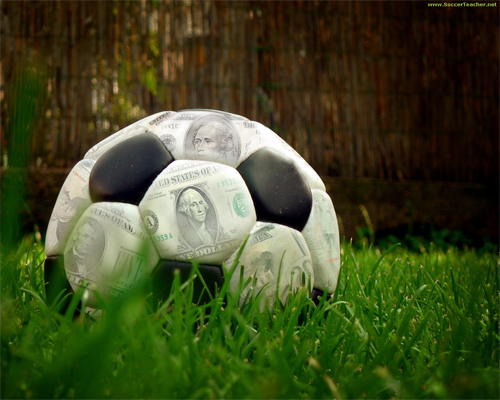 ESPN The Magazine’s Money Issue salary survey project reveals that average paychecks of athletes in US professional leagues pale in comparison to the wages of top soccer players in Europe. Barcelona topped the rankings with a total wage bill of $217 million and an average player salary of $8.7 million. Real Madrid’s average wages came in second at about $7.8 million though the club’s total payroll was about $3 million less than the New York Yankees baseball team.
ESPN The Magazine’s Money Issue salary survey project reveals that average paychecks of athletes in US professional leagues pale in comparison to the wages of top soccer players in Europe. Barcelona topped the rankings with a total wage bill of $217 million and an average player salary of $8.7 million. Real Madrid’s average wages came in second at about $7.8 million though the club’s total payroll was about $3 million less than the New York Yankees baseball team.
7 of the top 10 highest paying sports teams are European soccer clubs, including Manchester City, Chelsea, AC Milan, Bayern Munich, and Inter. The lowest-paying teams are from Major League Soccer and the Canadian Football League.
The survey was conducted by sportingintelligence.com for ESPN. It accounted for 278 teams in 14 major pro leagues, covering seven sports in 10 countries, comprising 7,925 athletes making a combined $15.69 billion in salary. Read the full article here.
For more information, see Deloitte’s annual report on European soccer revenues here.
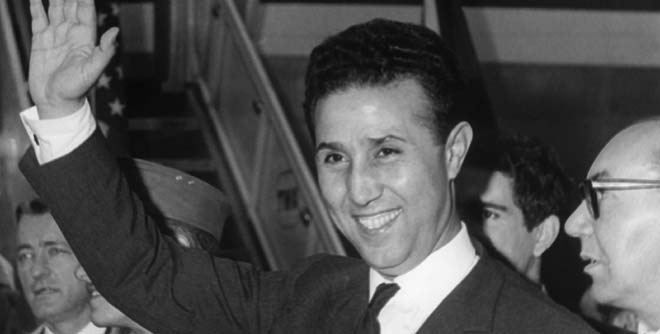
Ahmed Ben Bella, the first president of Algeria, died in Algiers at the age of 93. The son a farmer and petty trader, Ben Bella lived a life of struggle, beginning at the age of 16. As James Gregory’s poignant obituary in today’s New York Times explained, “Ben Bella chafed at colonialism from an early age — he recalled a run-in with a racist secondary school teacher — and complained of France’s cultural influence. ‘We think in Arabic, but we talk in French,’ he said.” Ben Bella’s political conscience was sharpened on high school football pitches under colonial rule. “When I maneuvered at speed against the enemy,” Bella remembered, “nobody asked me whether I was European or Algerian — I either scored or I didn’t, and that was that. I was responsible only to myself for success and failure alike.”
Conscripted into the French military in 1937, Ben Bella “took to soldiering as readily as he had to soccer back home. He was promoted to sergeant and won celebrity as a soccer star in Marseille,” according to the Times. He earned the Croix de Guerre for bringing down German bombers with his anti-aircraft gun during the Nazi assault in 1940. After the fall of Marseilles, Ben Bella was offered a professional football contract but turned it down and returned home instead. He eventually joined the Free French forces under De Gaulle and was decorated again for his role in the Italian campaign of 1944. After the war, he became a leader in the Algerian independence movement.
Ben Bella, like other African nationalists, believed that football — originally a European colonial game — could be appropriated and made to express African people’s desire for equality and freedom. While in exile during the second phase of Algeria’s war of independence (1958-62), he lent his imprimatur to the FLN XI — a remarkable team of France-based professionals formed in 1958 that came to symbolize Algeria’s quest for freedom and its crystallizing national identity. (For more details about the history of this team, see my book African Soccerscapes and Ian Hawkey’s Feet of the Chameleon. French readers can also consult R. Saadallah and D. Benfars’s La Glorieuse Équipe du FLN and Michel Nait-Challal’s Dribbleurs de l’indépendance.)
Ben Bella later became Algeria’s first Prime Minister and then its first president (1963-65), until a military coup got rid of him and kept him under house arrest for 14 years. Exiled in 1980, he still managed to celebrate Algeria’s 2-1 victory over West Germany in the 1982 World Cup: the first World Cup win by an African team against a European side (highlights here). Ben Bella returned to Algeria in 1990 and remained politically engaged, as an opponent of the U.S. war in Iraq, and as a critic of global capitalism and radical Islamism. Ultimately, his football style and leadership style informed each other: “Ben Bella always wanted his teammates to pass the ball so that he could score,” a former schoolmate recalled. “He was the same in politics.”
—
Suggested Reading
Mahfoud Amara, “Football Sub-Culture and Youth Politics in Algeria,” Mediterranean Politics, 17, 1 (2012): 41-58.